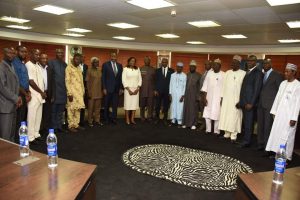The executive vice chairman of the Nigeria Communication Commission (NCC) delivered the opening speech at the Inauguration Of The Inter-Agency Committee for the Evaluation Of 2017 Research Proposals from the Academia, which held at the Commission’s Head Office in Abuja on September 13th, 2017.
See speech and pictures from the event below;
It is my pleasure to welcome you to this ceremony this morning and to thank you for agreeing to work with us on a programme that is vital to the telecommunications industry and also very valuable to the academic community by way of adding value to research output. Finding local solutions to the challenges of the industry is a policy that is very dear to us and this is very much in tandem with the policy of the Buhari administration for Nigerians to rise up and find enduring solutions to the challenges facing the country.
Our choice has been to deliberately utilize the capacity resident in the academia and to redirect it towards getting involved in research activities that can impact on business and society leading to the development of new products and services for the entire industry.
We are also of the strong opinion that for an industry that has recorded globally appreciable growth over the years, contributing an average of 9 per cent to the country’s GDP, the sector has capacity to contribute to the expansion of knowledge in the academia and consequently profit from such contribution.
This gathering underlines the importance of the foregoing, and to point a way to the direction we are headed. In my communications with Vice Chancellors of Nigerian Universities and in our recent Stakeholders Consultative Forum with Academia which held in Abuja here in the month of July, I have had to point out some recent developments in the Commission which include:
creating a Department of Research and Development to consolidate all research activities. That means research activities will attract priority attention going forward.
It should be very evident therefore that although the Commission’s engagement with academia has been on for a couple of years, a fresh impetus has thus been added to ensure that such an engagement becomes very robust, productive and beneficial to the various stakeholders.
Are we on the right track? The enthusiastic attendance of Vice Chancellors drawn from 61 universities across the country on the advice of the National Universities Commission (NUC), and the frank discussions and contributions at our Stakeholders Forum with Academia, constantly reminds me that we are on the right track.
For a whole day, we all discussed the overriding importance of the much expected relationship between the gown and industry and how best to appropriate the products of that relationship.
I have also been informed that we have a record response to our advert requesting for research proposals from the Academia this year.
At the close of entry on July 31, we had 96 submissions, 40 more than the 56 that was recorded the previous year. I am excited at the diversity of the research topics, from core telecommunications issues to oil pipeline protection and herdsmen tracking.
Telecommunications is a super infrastructure industry that addresses the concerns of other industries or put differently that facilitates growth and development of other industries. Our goal is to be able to use this intervention to address industry problems as well as some other societal issues that need urgent attention.
Coming from the academia, I am in a position to inform this Committee that you have your job cut out for you, and it’s quite a huge one. The reason being that as the research proposals increase so also is the number of documents that you have to go through.
The other reason is that we want to give every entry a fair opportunity in the contest, meaning that the Committee members will be challenged to go through every document in order to achieve a very fair assessment of every submission.
However, you will agree with me that there are few requirements that stand out in the evaluation criteria that a proposal must meet. They include but are not limited to the following:
• Clear statement and explanation of the problem.
• Clear statement and explanation of the problem.
• Proposed solution to the problem
• Clear relevance to the telecommunication industry
• Evidence of local realization up to prototype
• Cost reasonableness (cost of actualizing the idea excluding furniture and allowances)
• Schedule of project organization
• Coherent presentation/packaging of concept; and
• Integration of research with education (capacity building of students via the implementation of the project in the institution).
Ladies and Gentlemen, while I want to state here very categorically that our budget is not elastic due to the prevailing economy which is slowly rising out of recession, I will want to quickly add that the Commission is very passionate about students getting involved in implementing proposals and being given the opportunity to contribute to develop new solutions for the telecommunications sector.
For this reason we are irrevocably committed to the implementation of the selected proposals and can vouch for their sustainability into the foreseeable future. Let me personally canvass that we pick proposals with definite timelines of implementation.
It is now my singular honour and privilege to formally inaugurate this Inter-Agency Committee and I wish you well in all your deliberations.
see picture below;


(L-R): Prof. Losmas I. Ani, University of Nigeria Nsukka, Prof Umar Garba Danbatta Executive Vice Chairman, NCC; Abigail Sholanke, Director Research and Development Department, NCC; Prof. Muhammed Muzu Ahmadu Bello University; Usman Malah ,Chief of Staff to the Executive Vice Chairman, NCC during the inauguration of inter-agency committee for the 2017 research proposals at the Commission’s Head Office, Abuja.






